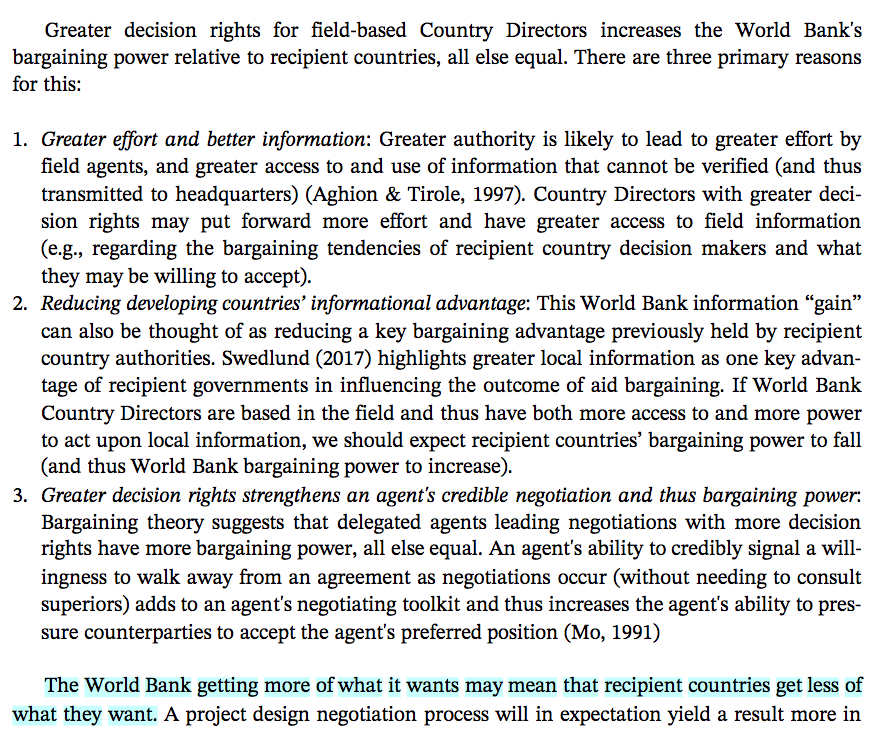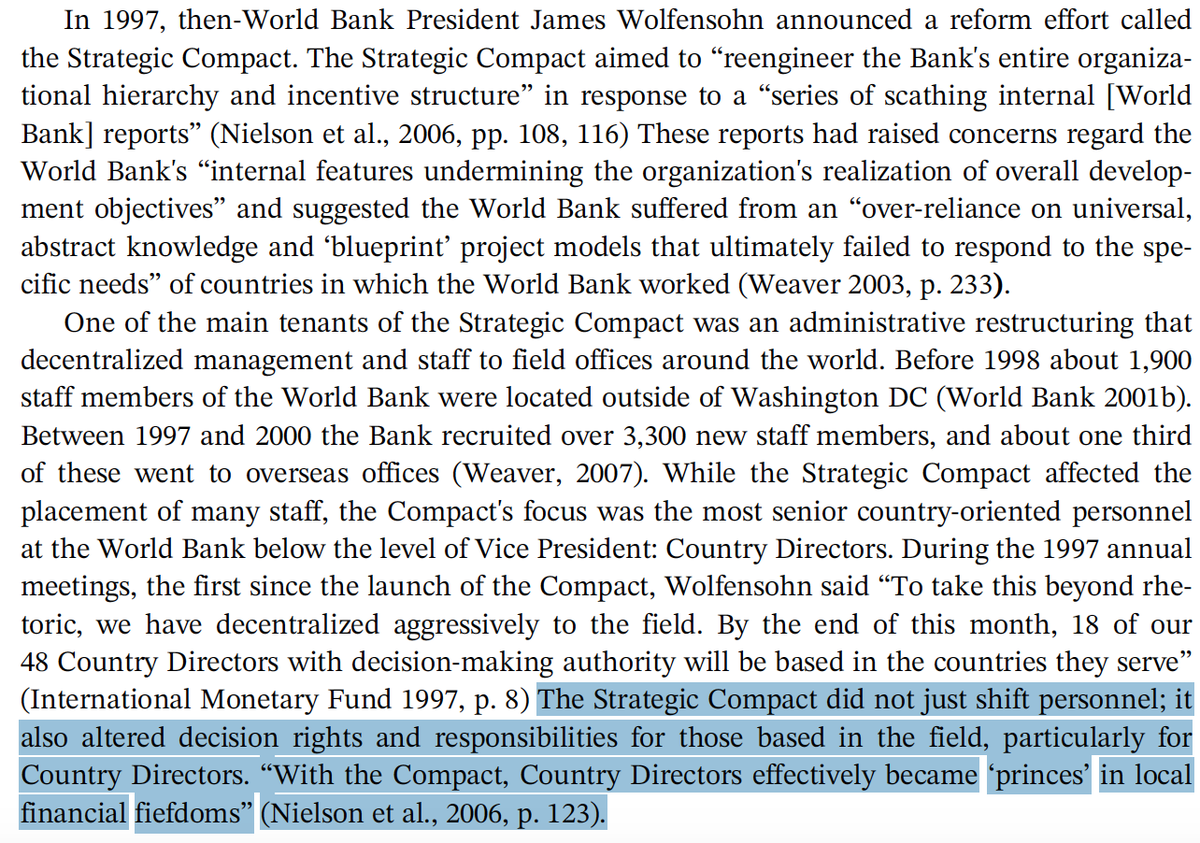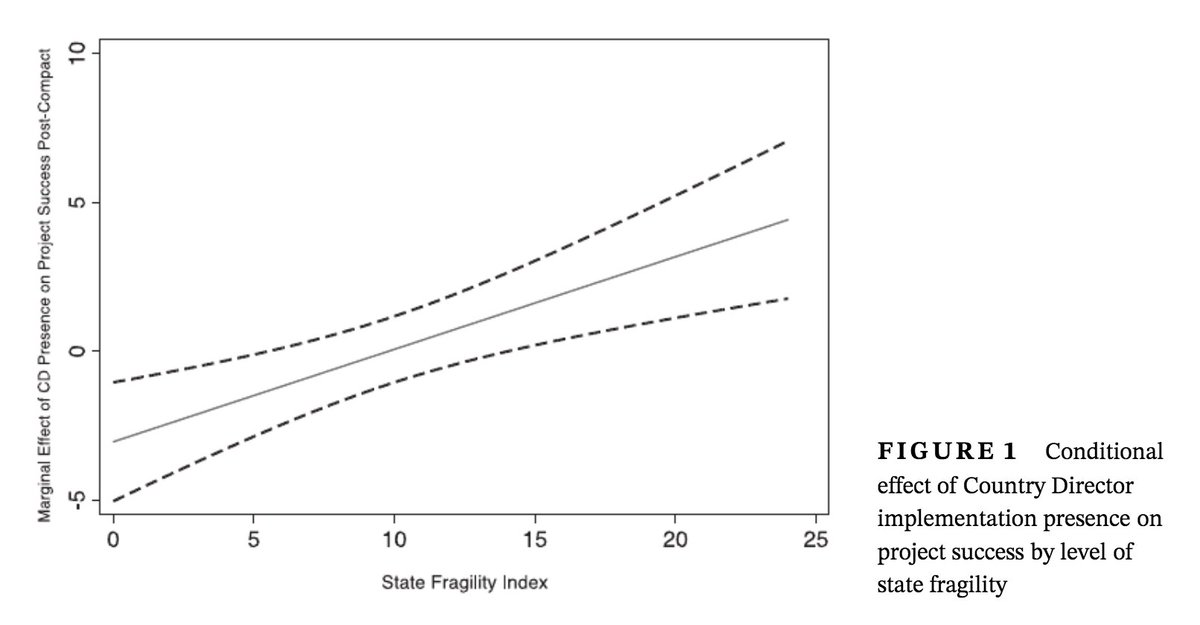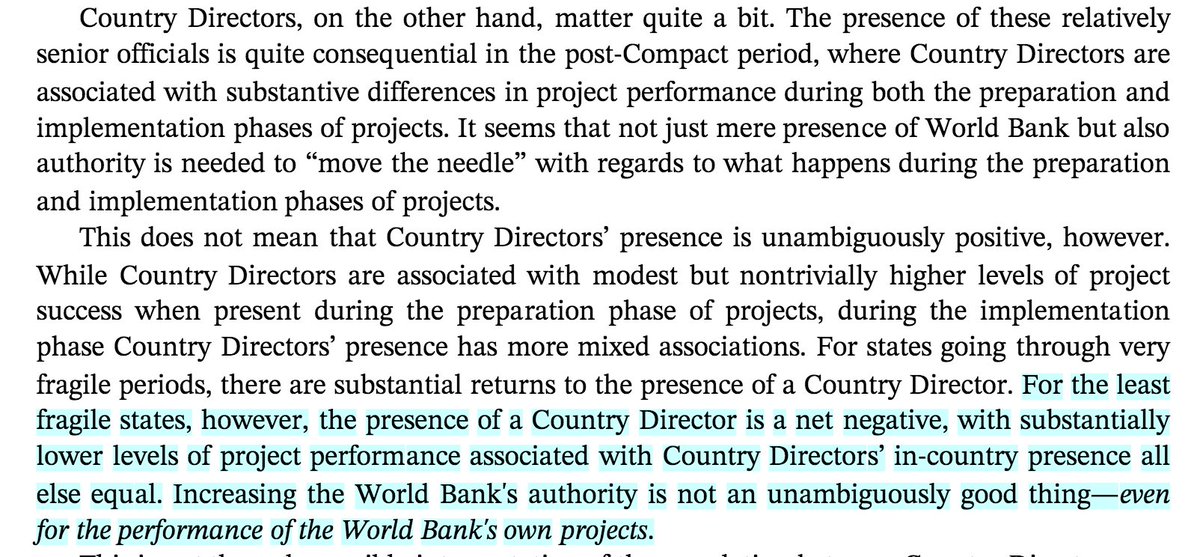I have a new paper out in @Gov_Journal! Tl;dr: Just putting @WorldBank personnel in the field doesn’t do much. Country Directors DO matter; but only after the Strategic Compact gave them more power, and not always positively. 1/ https://onlinelibrary.wiley.com/doi/full/10.1111/gove.12493">https://onlinelibrary.wiley.com/doi/full/...
(Last week I mentioned this paper briefly in tweeting about the Governance special issue as a whole; today I want to talk about my paper in that larger issue) 2/ https://twitter.com/Gov_Journal/status/1298635715606204419?s=20">https://twitter.com/Gov_Journ...
First, a brief background: this paper started because Homi Kharas @BrookingsGlobal asked me at a Brookings forum “If it’s better to give more control to people in the field, as your book (Navigation by Judgment) claims, surely it’s also better for people to be IN the field?” 3/
I thought that was probably true in the sense of implementing staff in field vs. HQ, as even without power you can learn about context by being there. But it felt hard to study well, as would need a massive amount of data on staff placement/rotation to study systematically. 4/
I also thought WB data might show us something more nuanced that I couldn& #39;t argue in my book as I didn& #39;t have the data. Specifically, WB often sent VERY senior folks to the field, and I wasn’t so sure this was always a good thing. 5/
Often the BEST placed folks to make decisions are local leaders (Gov& #39;t and non-gov& #39;t), as I& #39;ve argued elsewhere. ( https://www.dlprog.org/opinions/let-local-leaders-lead-why-donors-should-create-more-space-for-local-leadership)">https://www.dlprog.org/opinions/... Implementing staff in the field will often consult or even delegate onwards to them, as @SusannaCampbell nicely illustrates in her work. 6/
I worried that putting senior management in the field would work the other way. That is,it would increase the WB& #39;s bargaining power in the “development dance” (to borrow @hayleyswedlund& #39;s excellent frame), with more donor influence coming at the expense of "country ownership".7/
Aid folks often talk about "letting the driver steer", letting countries run aid projects. If the person who supplied the  https://abs.twimg.com/emoji/v2/... draggable="false" alt="💰" title="Geldsack" aria-label="Emoji: Geldsack"> for the
https://abs.twimg.com/emoji/v2/... draggable="false" alt="💰" title="Geldsack" aria-label="Emoji: Geldsack"> for the  https://abs.twimg.com/emoji/v2/... draggable="false" alt="🚗" title="Auto" aria-label="Emoji: Auto"> is sitting in the passenger seat, driving will be different - the funder will give a lot of directions, and I thought maybe that would be bad.8/
https://abs.twimg.com/emoji/v2/... draggable="false" alt="🚗" title="Auto" aria-label="Emoji: Auto"> is sitting in the passenger seat, driving will be different - the funder will give a lot of directions, and I thought maybe that would be bad.8/
In response to a request the awesome team at WB archives (twitterless so tagging @wb_research) dug up a 2005 spreadsheet with ALL WB field missions 1947-2005 and their personnel. This data is publicly downloadable from the paper’s replication archive ( https://doi.org/10.7910/DVN/E8KPJF)">https://doi.org/10.7910/D... 9/
This allowed me to examine 1) presence/absence of personnel of different levels/statuses & 2) whether the “Strategic Compact” (a big 1997 change that gave Country Directors more power) changed things at all. 10/
The amazing data, with names of all personnel, allowed me to put in a fixed effect FOR EVERY PERSON – so these results are not driven by any fixed differences in ability, or effectiveness, etc. of any given individual. 11/
So what did I find? 1) Contrary my expectations, just having staff in-country (vs. none) during implementation or preparation of a project is associated with very little (and probably no) difference in WB project performance as-assessed post-project. 12/
2) Pre-strategic compact Country Directors in the field don’t matter much either; 3) but after CDs get more power, they DO matter (including when restricting to countries who had CDs before/result not driven by country selection during decentralization) 13/
4) HOWEVER, this “mattering” is only associated with gains in assessed project performance in fragile states (or more precisely as a given state becomes more fragile over time; all models have country fixed effects, too) 15/
As states become less and less fragile, the presence of a Country Director HURTS performance relative to a director being based outside DC. 16/
Taken as a whole I think these results suggest that people in the field vs. HQ matter… but only when those people have decision power. And “power” for the donor is not always a good thing. 17/
I think there’s a ton to be done to reform management in aid agencies, and that more power in the field is a big part of the way forward. https://www.cgdev.org/publication/managing-better-what-all-us-can-do-encourage-aid-success">https://www.cgdev.org/publicati... 18/
But this is in no small part because more autonomy to the field requires a shift in accountability, and will promote onwards empowerment of local leaders. 19/ https://www.cgdev.org/publication/actually-navigating-judgment-towards-new-paradigm-donor-accountability-where-current">https://www.cgdev.org/publicati...
Putting senior leaders in the field doesn& #39;t require rethinking accountability. Shifting from "accounting based" to "account based" accountability is a key part of what Navigation by Judgment IS, IMHO. 20/ https://www.cgdev.org/blog/putting-account-center-accountability-why-ict-wont-improve-education-systems-and-beyond">https://www.cgdev.org/blog/putt...
I open the paper with a quote from former WB President Wolfensohn, reflecting on the Strategic Compact he catalyzed. I close by agreeing wholeheartedly that it& #39;s "preposterous" to think DC needs call all the shots. But I& #39;m not so sure the rest is always true. 20/
Better decisions aren& #39;t just about presence, and they& #39;re not just about power either; they& #39;re about who gets to lead in the complicated & complex co-produced multi-million dollar one-off organization we call an aid project. 21/
Homi& #39;s question and this work have gotten me thinking with more nuance about aid agencies, power, control, autonomy, and esp. accountability. I hope it may be of some use to others too - particularly folks deciding how to set up or alter aid orgs (e.g. @FCDOGovUK) 22/
& @WorldBank_IEG as it reviews experience w/ decentralization (full disclosure, I& #39;m a peer reviewer for this currently ongoing study) as the WB contemplating further decentralization to the field (publicly described here: https://www.devex.com/news/in-decentralization-push-world-bank-to-relocate-hundreds-of-dc-staffers-95875)">https://www.devex.com/news/in-d... 23/
https://www.devetwitter.com/news/in-decentralization-push-world-bank-to-relocate-hundreds-of-dc-staffers-95875
Thanks for reading.  https://abs.twimg.com/emoji/v2/... draggable="false" alt="🙏" title="Folded hands" aria-label="Emoji: Folded hands">
https://abs.twimg.com/emoji/v2/... draggable="false" alt="🙏" title="Folded hands" aria-label="Emoji: Folded hands"> https://abs.twimg.com/emoji/v2/... draggable="false" alt="🙏" title="Folded hands" aria-label="Emoji: Folded hands">
https://abs.twimg.com/emoji/v2/... draggable="false" alt="🙏" title="Folded hands" aria-label="Emoji: Folded hands"> https://abs.twimg.com/emoji/v2/... draggable="false" alt="🙏" title="Folded hands" aria-label="Emoji: Folded hands"> Again, the paper’s online here: https://onlinelibrary.wiley.com/doi/full/10.1111/gove.12493;">https://onlinelibrary.wiley.com/doi/full/... For those who may not have access to the gated paper, the author’s final version is on my website, http://danhonig.info"> http://danhonig.info (just scroll down to the group of files). (end)
https://abs.twimg.com/emoji/v2/... draggable="false" alt="🙏" title="Folded hands" aria-label="Emoji: Folded hands"> Again, the paper’s online here: https://onlinelibrary.wiley.com/doi/full/10.1111/gove.12493;">https://onlinelibrary.wiley.com/doi/full/... For those who may not have access to the gated paper, the author’s final version is on my website, http://danhonig.info"> http://danhonig.info (just scroll down to the group of files). (end)
Also, apologies to @hjswedlund whose handle I missed AND whose name I misspelled.

 Read on Twitter
Read on Twitter
 for the https://abs.twimg.com/emoji/v2/... draggable="false" alt="🚗" title="Auto" aria-label="Emoji: Auto"> is sitting in the passenger seat, driving will be different - the funder will give a lot of directions, and I thought maybe that would be bad.8/" title="Aid folks often talk about "letting the driver steer", letting countries run aid projects. If the person who supplied the https://abs.twimg.com/emoji/v2/... draggable="false" alt="💰" title="Geldsack" aria-label="Emoji: Geldsack"> for the https://abs.twimg.com/emoji/v2/... draggable="false" alt="🚗" title="Auto" aria-label="Emoji: Auto"> is sitting in the passenger seat, driving will be different - the funder will give a lot of directions, and I thought maybe that would be bad.8/" class="img-responsive" style="max-width:100%;"/>
for the https://abs.twimg.com/emoji/v2/... draggable="false" alt="🚗" title="Auto" aria-label="Emoji: Auto"> is sitting in the passenger seat, driving will be different - the funder will give a lot of directions, and I thought maybe that would be bad.8/" title="Aid folks often talk about "letting the driver steer", letting countries run aid projects. If the person who supplied the https://abs.twimg.com/emoji/v2/... draggable="false" alt="💰" title="Geldsack" aria-label="Emoji: Geldsack"> for the https://abs.twimg.com/emoji/v2/... draggable="false" alt="🚗" title="Auto" aria-label="Emoji: Auto"> is sitting in the passenger seat, driving will be different - the funder will give a lot of directions, and I thought maybe that would be bad.8/" class="img-responsive" style="max-width:100%;"/>








